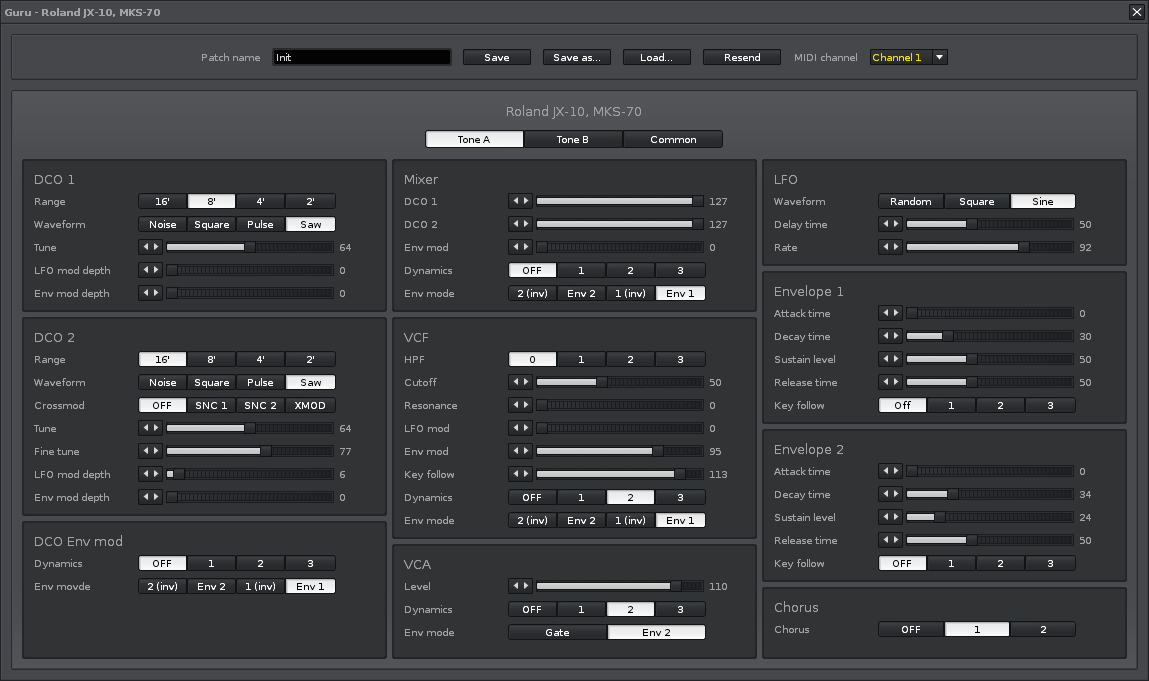This is what I got so far:
return SynthDefinition {
name = "DSI Tetra",
author = "DBY",
sysex_message_start = {0x41, 0x36, 0x00, 0x21, 0x20, 0x01},
Container {
name = "DSI Tetra",
style = "panel",
Container {
name = "OSC",
Container {
name = "OSC 1",
Parameter {
id = "osc_1_freq",
name = "Frequency",
type = "nrpn",
number = 0,
max_value = 120
},
Parameter {
id = "osc_1_freq_fine",
name = "Fine Tune",
type = "nrpn",
number = 1,
max_value = 100,
default_value = 50
},
Parameter {
id = "osc_1_shape",
name = "Shape",
type = "nrpn",
number = 2,
max_value = 103
},
Parameter {
id = "osc_1_glide",
name = "Glide",
type = "nrpn",
number = 3,
max_value = 127
},
Parameter {
id = "osc_1_key",
name = "Key Track",
type = "nrpn",
number = 4,
items = {"Off","On"},
max_value = 1
},
Parameter {
id = "sub_osc_1",
name = "Sub OSC",
type = "nrpn",
number = 5,
max_value = 127
}
},
Container {
name = "OSC 2",
Parameter {
id = "osc_2_freq",
name = "Frequency",
type = "nrpn",
number = 6,
max_value = 120
},
Parameter {
id = "osc_2_freq_fine",
name = "Fine Tune",
type = "nrpn",
number = 7,
max_value = 100,
default_value = 50
},
Parameter {
id = "osc_2_shape",
name = "Shape",
type = "nrpn",
number = 8,
max_value = 103
},
Parameter {
id = "osc_2_glide",
name = "Glide",
type = "nrpn",
number = 9,
max_value = 127
},
Parameter {
id = "osc_2_key",
name = "Key Track",
type = "nrpn",
number = 10,
items = {"Off","On"},
max_value = 1
},
Parameter {
id = "sub_osc_2",
name = "Sub OSC",
type = "nrpn",
number = 11,
max_value = 127
}
},
Parameter {
id = "osc_hard_sync",
name = "Hard Sync",
type = "nrpn",
number = 12,
items = {"Off","On"},
max_value = 1
},
Parameter {
id = "glide_mode",
name = "Glide Mode",
type = "nrpn",
number = 13,
items = {"Fixed Rate","Fixed Rate Auto","Fixed Time","Fixed Time Auto"},
max_value = 3
},
Parameter {
id = "osc_slop",
name = "OSC Slop",
type = "nrpn",
number = 14,
max_value = 5
},
Parameter {
id = "pitch_range",
name = "Pitch Bend Range",
type = "nrpn",
number = 15,
max_value = 12
},
Parameter {
id = "osc_mix",
name = "OSC 1-2 Mix",
type = "nrpn",
number = 16,
max_value = 127,
default_value = 64
},
Parameter {
id = "noise_level",
name = "Noise Level",
type = "nrpn",
number = 17,
max_value = 127
},
Parameter {
id = "feedback_volume",
name = "Feedback Volume",
type = "nrpn",
number = 18,
max_value = 127
},
Parameter {
id = "feedback_gain",
name = "Feedback Gain",
type = "nrpn",
number = 19,
max_value = 127
}
}
}
}
I have set max values, but the sliders still go to 16383.
There is some sort of communication, the sound is changed but not the way it’s supposed to.
